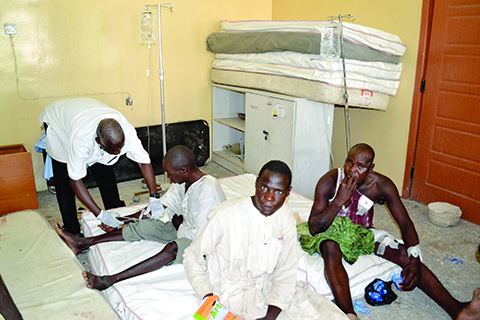 Victims of suicide bomb blasts receive treatment at an hospital in Miduguri on October 16, 2015. At least 34 people were killed in a wave of suicide bomb attacks in northeast Nigeria, as the military warned today Boko Haram militants threaten the country's sovereignty. Thirty died in a double bombing on a mosque in Molai on Thursday night. AFP PHOTO/STRINGER
Victims of suicide bomb blasts receive treatment at an hospital in Miduguri on October 16, 2015. At least 34 people were killed in a wave of suicide bomb attacks in northeast Nigeria, as the military warned today Boko Haram militants threaten the country's sovereignty. Thirty died in a double bombing on a mosque in Molai on Thursday night. AFP PHOTO/STRINGER
MAIDUGURI: At least 34 people were killed in a wave of suicide bomb attacks in northeast Nigeria, as the military yesterday warned Boko Haram militants threaten the country's sovereignty. Thirty died in a double bombing on a mosque in Molai on Thursday night, Mohammed Kanar, from the National Emergency Management Agency (NEMA) said. Three female bombers blew themselves up and killed four others in nearby Umarari early Friday, he added.
Locals, however, said the death toll was higher from both incidents and that more than 60 may have been killed in total. Both areas are on the outskirts of the Borno state capital of Maiduguri, which has been increasingly targeted by coordinated bomb and suicide attacks in recent weeks.
The attacks came just days after Nigeria's President Muhammadu Buhari said he was "fully confident" of ending the six-year insurgency by the end of this year.
The military was "well-positioned to meet the December deadline which they have been given", he said in a statement on Wednesday.
But with Maiduguri having been attacked four times this month alone, fresh questions will be asked about security in the city, where Boko Haram, which is allied to the Islamic State group in Syria and Iraq, was founded in 2002. One area of the city, Ajilari Cross, has been hit three times in a month, killing more than 120. There have also been suicide attacks near the capital, Abuja. Overall, some 1,350 people have been killed since Buhari came to power at the end of May, according to an AFP tally.
SOVEREIGNTY THREATENED
Buhari said on Wednesday that Boko Haram's "ability to attack, seize, ravage and hold any Nigerian territory will have been completely obliterated" by December.
This week, he met the head of the US Africa Command, General David Rodriguez, as Washington announced the deployment of up to 300 military personnel to northern Cameroon.
The US military will provide intelligence, surveillance and reconnaissance expertise, the White House said, after similar multiple suicide attacks in Cameroon, Chad and Niger. Guerrilla-style tactics against "soft" civilian targets such as mosques, markets and bus stations have increased.
Last week, 41 people were killed in triple explosions in Baga Sola, on the Chadian side of Lake Chad, where Nigeria meets Niger, Chad and Cameroon. On Friday, Nigeria's most senior army officer, Chief of Army Staff Lieutenant General Tukur Buratai, told troops "the next few days will be crucial" in the counter-insurgency.
"It is also crucial to our country, Nigeria. Our sovereignty as a nation is threatened. The Nigerian Army and indeed the military as the symbol of our nationhood is being challenged. "Our ability to stand and defeat the Boko Haram terrorists in the next few weeks will determine the future of our country. We cannot afford to lose the fight," he said.
MOSQUES TARGETED
The greater sense of urgency may be attributed to fears of a resumption of attacks in hard-to-reach rural areas of northeast Nigeria once the rainy season ends. Should that happen, troops attempting to secure towns and cities would face overstretch to tackle the Islamists in the countryside, which Boko Haram controlled last year.
A US presence in northern Cameroon could help boost intelligence efforts to thwart planned attacks across the Lake Chad region. But the repeated attacks on Maiduguri have demonstrated the difficulties in combating the threat to urban areas. In Mulai, NEMA's Kanar and witnesses said the bombers appeared to have slipped into the mosque disguised as worshippers before evening prayers at 6:30 pm (1730 GMT).
"When rescuers and sympathisers gathered in front of the place, the second one went off, killing many of them," said Amadu Marte, a civilian vigilante assisting the army. Marte said he and colleagues counted 42 bodies at the scene. Friday's attack in Umarari, a village of mainly poor farmers and labourers some seven kilometres (4.5 miles) west of Maiduguri, also happened at a mosque shortly after 5:00 am. Witness Dawud Baana said worshippers were preparing for morning prayers at the time.
Street vendor Saratu Garba said she heard the blast as she was carrying firewood out of her house and that 19 were killed. Boko Haram has a track record of attacking mosques, considering places of worship that do not share its radical interpretation of Islam as a legitimate target. - AFP




